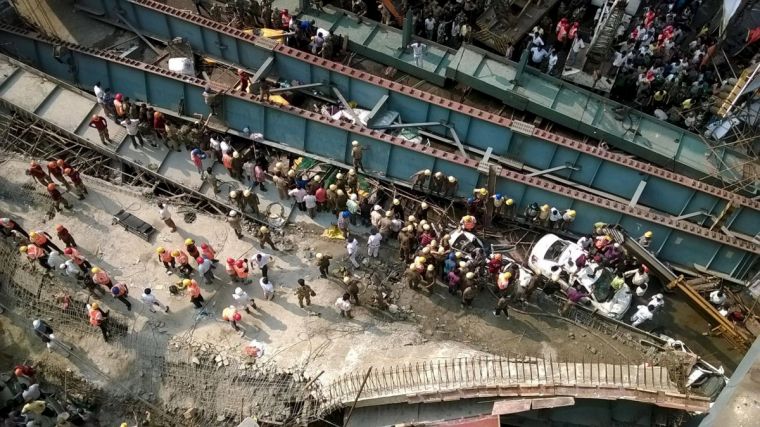Was the Kolkata flyover collapse an act of God?

The Kolkata flyover collapse has been described as an "act of God" by a spokesman for the contractors.
It's a claim that has drawn outrage from Indian commentators on social media. "This evil guy is already looking to escape from his responsibility," wrote Ghosal Deb on Facebook. "Don't blame God. It is act of corruption," according to Nurani Vydeeswaran Sundaram. And for Abhijit Srivastava, "calling it an 'Act of God' is like a slap in the face of rationality and common sense".
Just how disgustingly insensitive is this statement? "An act of God" really? Such idiots. #Kolkata #KolkataFlyOver https://t.co/tYMSSbZzSA
— Prerna Bakshi (@bprerna) March 31, 2016
Well, no arguments with that. In fairness to K Panduranga Rao, the author of the quote, he is probably regretting it. It may have been uttered as an expression of bewilderment, an instinctive reaction to an event for which he was completely unprepared, but it came across as an attempt to avoid responsibility for the tragedy, which was caused not by divine action but by human negligence. A police investigation has already begun, but properly-run construction projects do not result in large structures collapsing before they are finished.
India has a problem with the collapse of sub-standard buildings. It's been estimated 2,000 people lose their lives every year because of them – a huge figure. But the tendency of human beings to blame their problems on God is not limited to India.
Sometimes it really is about blame-shifting. It's easier for someone to believe nothing could be done – that a tragedy was an 'Act of God' in the sense insurers use the expression – rather than accept their own greed, carelessness or incompetence was behind it. More often, and more dangerously, this sense that God is personally involved in directing disasters is the result of a flawed theological understanding of his sovereignty.
Because he is omnipotent he can do anything, the argument runs. The Bible appears to show him in control of the smallest details of our lives. Even the hairs of our heads are numbered. God sets up and deposes kings and orders the affairs of nations. He brings famines and plenty, droughts and rains. In the more extreme forms of Calvinistic belief, it's hard to find any room for human freedom at all.
But this is to misunderstand the nature of sovereignty. Because God can control everything doesn't mean that he does. He does not collapse flyovers, burn buildings down or cause nuclear reactors to melt down. We do that ourselves. Neither does he set off tsunamis or earthquakes, or whisk up a typhoon. Those things just happen.
Of course, Christians are left with the inescapable wider problem of evil – why, if God is all-powerful, does he not, Superman-style, just hold up the collapsing bridge or stop the out-of-control car? Why earthquakes at all?
But a mature, thoughtful faith can cope with that. God is not distant from the world. He intervenes, but not all the time. There is a large amount of freedom and randomness in the way the world works.
And the right way to respond to a tragedy like Kolkata is not to say, "God did this", but "Where is God in this?" Then we find him in the lessons learned, the outpouring of human sympathy and the cries for justice. In the meantime, we pray for those who suffer and for those who grieve.
Follow Mark Woods on Twitter: @RevMarkWoods











